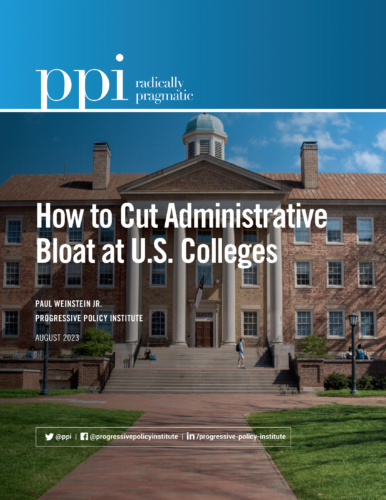As America’s students are heading back to school in the coming weeks, non-instructional spending at colleges and universities — which includes spending on administration and student services — have been skyrocketing over the last several decades. Yet, there is little evidence that this massive expansion in administration and services has improved students’ academic experience.
Today, the Progressive Policy Institute (PPI) released a new report “How to Cut Administrative Bloat at U.S. Colleges” detailing how administrative positions and spending at colleges and universities have grown disproportionately over the last several decades. Report author Paul Weinstein Jr., Senior Fellow at PPI, outlines the reasons administrative expenses and personnel at post-secondary institutions are rising and specifically reviewed faculty versus non-faculty positions at the top 50 universities in the country.
The report finds that on average, the top universities have only 1 faculty member per 11 students and by contrast, the same institutions have 1 non-faculty employee per 4 students. In fact, Weinstein finds that three universities on the list, California Institute of Technology, Duke University, and the University of California at San Diego have more non-faculty employees than students.
“The results of this research underscore that non-faculty employees at universities, both public and private, have grown considerably and without necessary oversight, under college presidents and their boards,” said Paul Weinstein Jr. “While some of this growth may have been necessary, there is no doubt that much of it has not.”
To address this growing issue and encourage universities to pass some of the savings on to students, Weinstein proposes to trim the number of non-faculty positions by 1% per year over the next five years. He also suggests that the federal government should shift its focus from increasing financial aid to using its leverage to encourage colleges and universities to reduce costs and lower tuition. Weinstein recommends that the government should be given the authority to negotiate the costs of tuition and fees with any post-secondary institution that accepts students who have received either grants, loans, or tax incentives from the federal government.

The Progressive Policy Institute (PPI) is a catalyst for policy innovation and political reform based in Washington, D.C. Its mission is to create radically pragmatic ideas for moving America beyond ideological and partisan deadlock. Learn more about PPI by visiting progressivepolicy.org.
Follow the Progressive Policy Institute.
Find an expert at PPI.
###
Media Contact: Amelia Fox – afox@ppionline.org